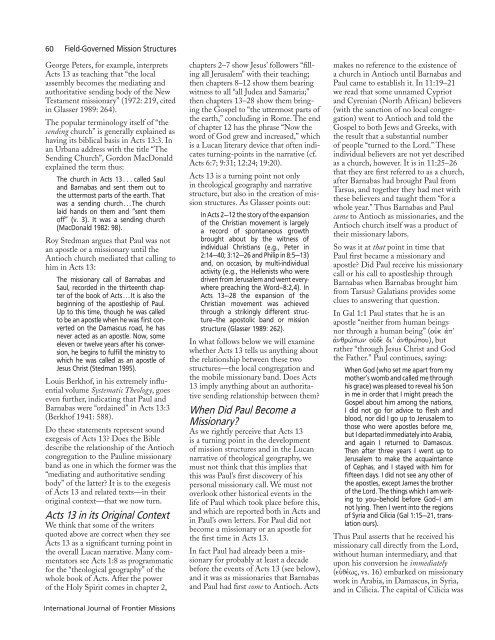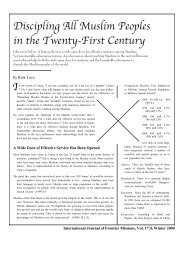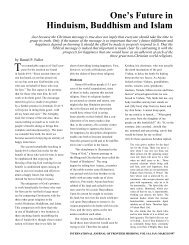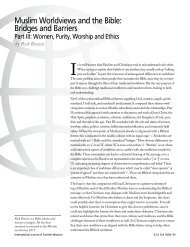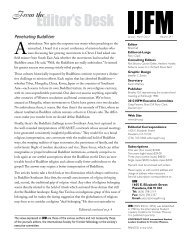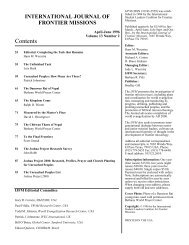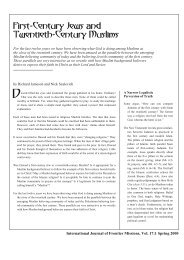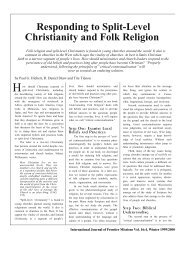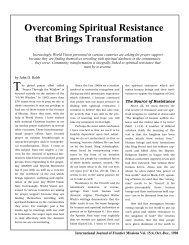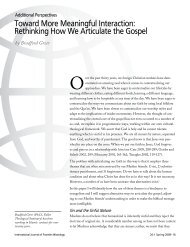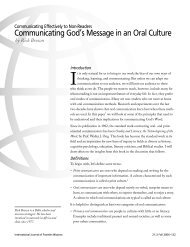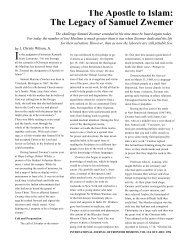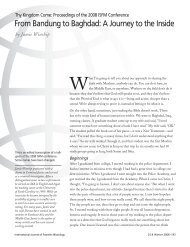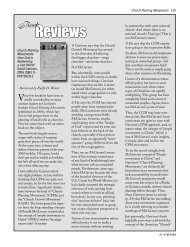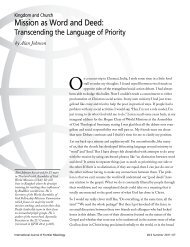Volume 18:2 - International Journal of Frontier Missions
Volume 18:2 - International Journal of Frontier Missions
Volume 18:2 - International Journal of Frontier Missions
You also want an ePaper? Increase the reach of your titles
YUMPU automatically turns print PDFs into web optimized ePapers that Google loves.
60 Field-Governed Mission Structures<br />
George Peters, for example, interprets<br />
Acts 13 as teaching that “the local<br />
assembly becomes the mediating and<br />
authoritative sending body <strong>of</strong> the New<br />
Testament missionary” (1972: 219, cited<br />
in Glasser 1989: 264).<br />
The popular terminology itself <strong>of</strong> “the<br />
sending church” is generally explained as<br />
having its biblical basis in Acts 13:3. In<br />
an Urbana address with the title “The<br />
Sending Church”, Gordon MacDonald<br />
explained the term thus:<br />
The church in Acts 13 . . . called Saul<br />
and Barnabas and sent them out to<br />
the uttermost parts <strong>of</strong> the earth. That<br />
was a sending church . . . The church<br />
laid hands on them and “sent them<br />
<strong>of</strong>f” (v. 3). It was a sending church<br />
(MacDonald 1982: 98).<br />
Roy Stedman argues that Paul was not<br />
an apostle or a missionary until the<br />
Antioch church mediated that calling to<br />
him in Acts 13:<br />
The missionary call <strong>of</strong> Barnabas and<br />
Saul, recorded in the thirteenth chapter<br />
<strong>of</strong> the book <strong>of</strong> Acts . . . It is also the<br />
beginning <strong>of</strong> the apostleship <strong>of</strong> Paul.<br />
Up to this time, though he was called<br />
to be an apostle when he was first converted<br />
on the Damascus road, he has<br />
never acted as an apostle. Now, some<br />
eleven or twelve years after his conversion,<br />
he begins to fulfill the ministry to<br />
which he was called as an apostle <strong>of</strong><br />
Jesus Christ (Stedman 1995).<br />
Louis Berkh<strong>of</strong>, in his extremely influential<br />
volume Systematic Theology, goes<br />
even further, indicating that Paul and<br />
Barnabas were “ordained” in Acts 13:3<br />
(Berkh<strong>of</strong> 1941: 588).<br />
Do these statements represent sound<br />
exegesis <strong>of</strong> Acts 13 Does the Bible<br />
describe the relationship <strong>of</strong> the Antioch<br />
congregation to the Pauline missionary<br />
band as one in which the former was the<br />
“mediating and authoritative sending<br />
body” <strong>of</strong> the latter It is to the exegesis<br />
<strong>of</strong> Acts 13 and related texts—in their<br />
original context—that we now turn.<br />
Acts 13 in its Original Context<br />
We think that some <strong>of</strong> the writers<br />
quoted above are correct when they see<br />
Acts 13 as a significant turning point in<br />
the overall Lucan narrative. Many commentators<br />
see Acts 1:8 as programmatic<br />
for the “theological geography” <strong>of</strong> the<br />
whole book <strong>of</strong> Acts. After the power<br />
<strong>of</strong> the Holy Spirit comes in chapter 2,<br />
<strong>International</strong> <strong>Journal</strong> <strong>of</strong> <strong>Frontier</strong> <strong>Missions</strong><br />
chapters 2–7 show Jesus’ followers “filling<br />
all Jerusalem” with their teaching;<br />
then chapters 8–12 show them bearing<br />
witness to all “all Judea and Samaria;”<br />
then chapters 13–28 show them bringing<br />
the Gospel to “the uttermost parts <strong>of</strong><br />
the earth,” concluding in Rome. The end<br />
<strong>of</strong> chapter 12 has the phrase “Now the<br />
word <strong>of</strong> God grew and increased,” which<br />
is a Lucan literary device that <strong>of</strong>ten indicates<br />
turning-points in the narrative (cf.<br />
Acts 6:7; 9:31; 12:24; 19:20).<br />
Acts 13 is a turning point not only<br />
in theological geography and narrative<br />
structure, but also in the creation <strong>of</strong> mission<br />
structures. As Glasser points out:<br />
In Acts 2–12 the story <strong>of</strong> the expansion<br />
<strong>of</strong> the Christian movement is largely<br />
a record <strong>of</strong> spontaneous growth<br />
brought about by the witness <strong>of</strong><br />
individual Christians (e.g., Peter in<br />
2:14–40; 3:12–26 and Philip in 8:5–13)<br />
and, on occasion, by multi-individual<br />
activity (e.g., the Hellenists who were<br />
driven from Jerusalem and went everywhere<br />
preaching the Word—8:2,4). In<br />
Acts 13–28 the expansion <strong>of</strong> the<br />
Christian movement was achieved<br />
through a strikingly different structure—the<br />
apostolic band or mission<br />
structure (Glasser 1989: 262).<br />
In what follows below we will examine<br />
whether Acts 13 tells us anything about<br />
the relationship between these two<br />
structures—the local congregation and<br />
the mobile missionary band. Does Acts<br />
13 imply anything about an authoritative<br />
sending relationship between them<br />
When Did Paul Become a<br />
Missionary<br />
As we rightly perceive that Acts 13<br />
is a turning point in the development<br />
<strong>of</strong> mission structures and in the Lucan<br />
narrative <strong>of</strong> theological geography, we<br />
must not think that this implies that<br />
this was Paul’s first discovery <strong>of</strong> his<br />
personal missionary call. We must not<br />
overlook other historical events in the<br />
life <strong>of</strong> Paul which took place before this,<br />
and which are reported both in Acts and<br />
in Paul’s own letters. For Paul did not<br />
become a missionary or an apostle for<br />
the first time in Acts 13.<br />
In fact Paul had already been a missionary<br />
for probably at least a decade<br />
before the events <strong>of</strong> Acts 13 (see below),<br />
and it was as missionaries that Barnabas<br />
and Paul had first come to Antioch. Acts<br />
makes no reference to the existence <strong>of</strong><br />
a church in Antioch until Barnabas and<br />
Paul came to establish it. In 11:19–21<br />
we read that some unnamed Cypriot<br />
and Cyrenian (North African) believers<br />
(with the sanction <strong>of</strong> no local congregation)<br />
went to Antioch and told the<br />
Gospel to both Jews and Greeks, with<br />
the result that a substantial number<br />
<strong>of</strong> people “turned to the Lord.” These<br />
individual believers are not yet described<br />
as a church, however. It is in 11:25–26<br />
that they are first referred to as a church,<br />
after Barnabas had brought Paul from<br />
Tarsus, and together they had met with<br />
these believers and taught them “for a<br />
whole year.” Thus Barnabas and Paul<br />
came to Antioch as missionaries, and the<br />
Antioch church itself was a product <strong>of</strong><br />
their missionary labors.<br />
So was it at that point in time that<br />
Paul first became a missionary and<br />
apostle Did Paul receive his missionary<br />
call or his call to apostleship through<br />
Barnabas when Barnabas brought him<br />
from Tarsus Galatians provides some<br />
clues to answering that question.<br />
In Gal 1:1 Paul states that he is an<br />
apostle “neither from human beings<br />
nor through a human being” (ouvk avpV<br />
avnqrw,pwn ouvde. diV avnqrw,pou), but<br />
rather “through Jesus Christ and God<br />
the Father.” Paul continues, saying:<br />
When God (who set me apart from my<br />
mother’s womb and called me through<br />
his grace) was pleased to reveal his Son<br />
in me in order that I might preach the<br />
Gospel about him among the nations,<br />
I did not go for advice to flesh and<br />
blood, nor did I go up to Jerusalem to<br />
those who were apostles before me,<br />
but I departed immediately into Arabia,<br />
and again I returned to Damascus.<br />
Then after three years I went up to<br />
Jerusalem to make the acquaintance<br />
<strong>of</strong> Cephas, and I stayed with him for<br />
fifteen days. I did not see any other <strong>of</strong><br />
the apostles, except James the brother<br />
<strong>of</strong> the Lord. The things which I am writing<br />
to you—behold before God—I am<br />
not lying. Then I went into the regions<br />
<strong>of</strong> Syria and Cilicia (Gal 1:15–21, translation<br />
ours).<br />
Thus Paul asserts that he received his<br />
missionary call directly from the Lord,<br />
without human intermediary, and that<br />
upon his conversion he immediately<br />
(euvqe,wj, vs. 16) embarked on missionary<br />
work in Arabia, in Damascus, in Syria,<br />
and in Cilicia. The capital <strong>of</strong> Cilicia was


